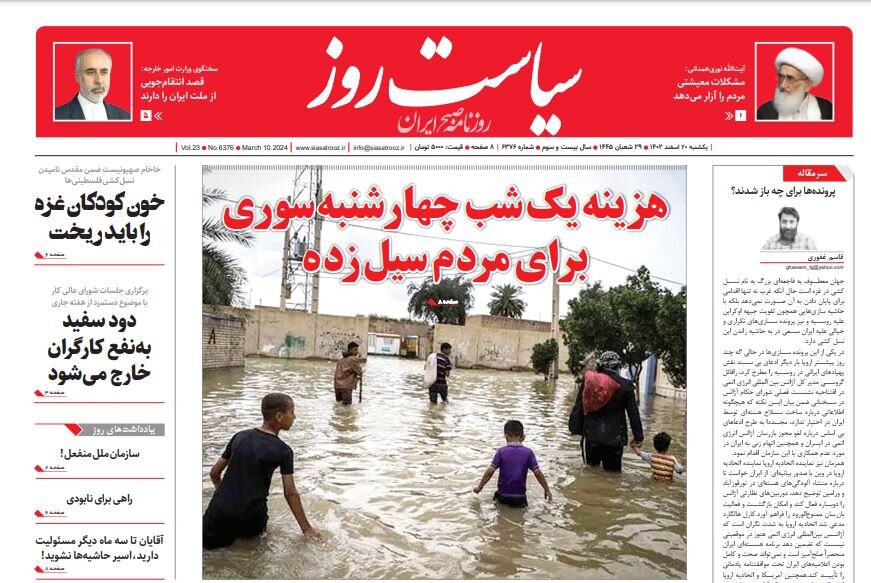The double standards of the West in dealing with Iran and Israel

TEHRAN - Siasat-e-Rooz dedicated its editorial to the dual behavior of the West and its supporters on the issue of Iran and Israel and said: Western and Persian-language media focused all their programs on Women's Day on the women of Iran and Afghanistan, as if Western women were in heaven, and the women of Iran and Afghanistan have critical and exceptional conditions.
The prescription of these media was to support riot, chaos, and military options. The truth is that investigating the situation of Western, Jewish, and Arab women reveals a terrible truth that is deliberately not addressed in these media and is practically accompanied by censorship. It is noteworthy that these media did not point out the martyrdom and massacre of 9,000 Palestinian women in Gaza during the five months of the Zionist regime's occupation. Also, the Director General of the IAEA and the Westerners, who have been slandering Iran in the nuclear field, have not pointed out the official threat of the Zionist regime to use nuclear weapons against the people of Gaza. The Westerners believe that by creating an atmosphere of inflammation inside and outside Iran, they will distract public opinion from the humanitarian disaster in Gaza and in some way support the Zionist regime.
Iran: Spreading anti-Iranian lies by the fact-finding committee!
In a note, the Iran newspaper addressed the alleged report of the UN Fact-Finding Committee and said: By publishing a report, this committee has claimed that the Islamic Republic of Iran committed crimes against humanity with "serious human rights violations" during the suppression of last year's protests. This committee claims that the Iranian government has taken this action with violence, persecution, and sexual harassment. More than 150 days have passed since the crimes of the Zionist regime in Gaza, but the fact-finding committee about Israel's crimes has not yet been formed. A regime that continues its crimes away from the eyes of the United Nations, an issue that was objected to by the Minister of Foreign Affairs of our country during Amir Abdollahian's recent visit to Geneva. He demanded the formation of a fact-finding committee regarding the crimes of the Zionist regime in the Gaza Strip, but still, not only was there no movement in this direction, but in the meantime, Iran was accused of crimes against humanity.
Arman-e-Melli: American stick in the hands of Europeans
In an article, Arman-e-Melli investigated the soft positions of the United States compared to Europe in the Iran nuclear issue. It wrote: These days, European countries have taken softer positions with Iran in joint statements and demanded Tehran's cooperation with the IAEA and even Tehran's compliance with its commitments in the JCPOA. Nevertheless, there are clear signs about the unwillingness of the United States to make Iran's nuclear case more critical. The Board of Governors of the International Atomic Energy Agency on Thursday, March 7, completed the review of issues related to Iran, and no decision or resolution was issued regarding Iran. This case shows that America is probably thinking of interacting with Tehran after the crisis in Israel and after the elections in Washington. If the Europeans take a strong position regarding the Iran nuclear issue, they are actually holding the stick of the Americans, because the carrot is now in the hands of the United States. From this point of view, some harsh positions of Europeans about Iran should not be taken seriously. Because the non-independent Europe against America is implementing America's policies against Iran.
Etemed: Tehran and Moscow on the path of tactical convergence
In an analysis, Etemad discussed the increase in military cooperation between Iran and Russia. It said: Russia seeks to impose a new order on the world through victory in Ukraine. Tehran has also shown its influence in the Middle East, especially in the recent conflicts that started in Gaza. This is the strategic investment in the Middle East region in contrast to the presence and influence of the West in this region. Considering the global concerns about the proliferation of nuclear weapons and the complexities of regional dynamics, the recent meeting between Iran and Russia has profound consequences for international relations. Since the world is closely monitoring these discussions, it becomes necessary to explain the challenges and potential results of this important diplomatic interaction. For Russia, closer relations with Iran are very important to increase the pressure on the United States in the Middle East. Washington is also concerned that Moscow has changed its position on Iran's nuclear program and is no longer against the development of Iran's nuclear capabilities. As it seems, Tehran and Moscow have become closer to creating a practical united front against the United States from the Black Sea to the Persian Gulf.
